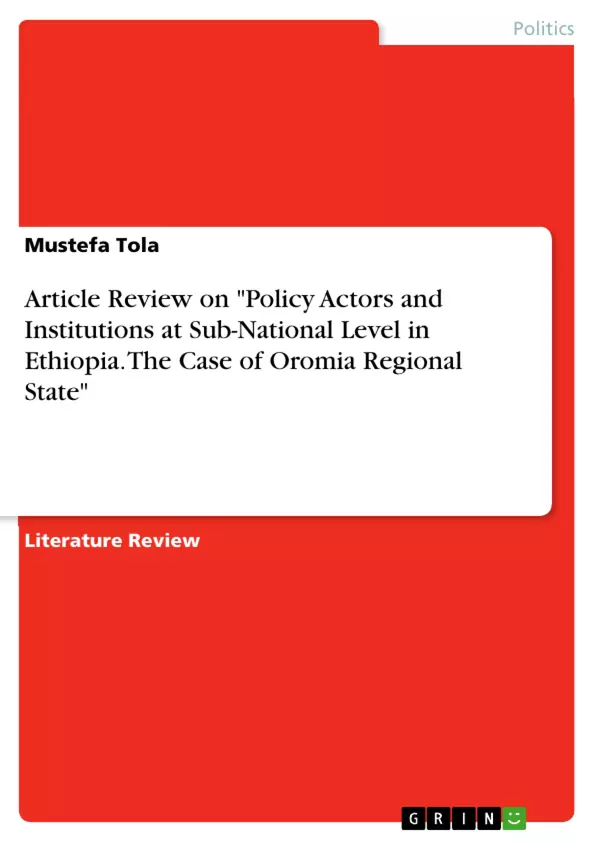This paper provides a review of "Policy Actors and Institutions at Sub-National Level in Ethiopia: The Case of Oromia Regional State" by Nigussie Daba Heyi. The article aims to bridge the gap between theoretical knowledge of policy-making and the practical processes and practices that take place in the Oromia regional state of Ethiopia.
The article covers the roles of different actors involved in the process of public policy-making in Ethiopia, with a particular focus on the Oromia regional state. It assesses the levels of influence and participation of various actors in the policy formulation at the sub-national level. This article was published in the Journal of Sustainable Development in Africa, Vol. 22, No. 2, 2020, and it provides clear and concise definitions of key policy concepts to aid readers' understanding.
The primary objective of this article is to examine the roles played by policy actors and institutions in the Oromia regional state. In addition, it explores other factors such as party politics, membership, ideology, policy analysis, and community participation. The article aims to identify the factors that affect the active participation of different policy actors in the policy-making process at the regional level.
Inhaltsverzeichnis (Table of Contents)
- Introduction
- Discussion of the Main Arguments
Zielsetzung und Themenschwerpunkte (Objectives and Key Themes)
The article aims to analyze the roles of policy actors and institutions in public policymaking in Ethiopia, particularly within the Oromia Regional State. It seeks to bridge the gap between theoretical policy knowledge and practical implementation, assessing the influence and participation of various actors in policy formulation at the sub-national level.
- Influence and participation of policy actors in public policy making in Ethiopia
- Factors affecting active participation of different policy actors in the policy making process
- The dominance of the executive leadership in the policy making process
- The role of political parties and ideology in shaping policy making
- The need for strengthening policy research institutions and enhancing participation
Zusammenfassung der Kapitel (Chapter Summaries)
Introduction
This section introduces the article's focus on policy actors and their roles in public policy making in Ethiopia, specifically in the Oromia Regional State. It highlights the objective of examining the influence and participation levels of various actors in policy formulation at the sub-national level. The article also provides a general overview of public policy concepts to aid understanding.
Discussion of the Main Arguments
This section delves into the author's primary arguments regarding the minimal participation and influence of policy actors in public policy making and implementation in Ethiopia. It examines the reasons behind this limited role, including the dominance of a single political party system, lack of awareness among actors, limited knowledge about public policy processes, and the absence of policy research institutions at the regional level. The section also explores the influence of party politics, ideology, and community participation.
Schlüsselwörter (Keywords)
The main keywords and focus topics of the text include policy actors, public policy making, Ethiopia, Oromia Regional State, participation, influence, political party, ideology, policy research, and institutions.
- Quote paper
- Mustefa Tola (Author), 2023, Article Review on "Policy Actors and Institutions at Sub-National Level in Ethiopia. The Case of Oromia Regional State", Munich, GRIN Verlag, https://www.grin.com/document/1349934



